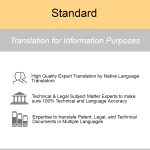Patent Translation Providers – PTE offers the most economical patent translation services to law firms and corporates.
Patent Translation Providers
The optimal decentralized policy is obtained by maximizing the retailer’s cost per unit time independently of the manufacturer’s cost. On the contrary, the centralized policy minimizes the total cost of the system. An algorithm is developed which determines the optimal order quantity and production cycle for each product. It should be noted that the same model is applicable to multi-echelon distribution/inventory systems in which a manufacturer supplies a single product to several retailers. Several numerical experiments chinese patent translation demonstrate the performance of the proposed models. The numerical results show that the centralized policy significantly outperforms the decentralized policy. Finally, the authors present a savings sharing mechanism whereby the manufacturer provides the retailer with a quantity discount which achieves a Pareto improvement among both participants of the supply chain. presented a new technique for decomposing and rationalizing large decision-making problems into a common and consistent framework. The focus of this paper has been to present a heuristic, called the hierarchical decomposition heuristic (HDH), which can be used to find globally feasible solutions to usually large decentralized and distributed decision-making problems when a centralized approach is not possible. The HDH is primarily intended to be applied as a standalone tool for managing a decentralized and distributed system when only globally consistent solutions are necessary or as a lower bound to a maximization problem within a global optimization strategy such as Lagrangean decomposition. The HDH was applied to an illustrative example based on an actual industrial multi-site system as well as to three small motivating examples and was able to solve these problems faster than a centralized model of the same problems when using both coordinated and collaborative approaches. present a fine planning for supply chains in semiconductor manufacturing. It is generally accepted that production planning and control, in the maketo- order environment of application-specific integrated circuit production, is a difficult task as it has to be optimal both for the local manufacturing units and for the whole supply chain network. Centralised MRP II systems which are in operation in most of today’s manufacturing enterprises are not flexible enough to satisfy the demands of this highly dynamic co-operative environment. In this paper Rupp et al. present a distributed planning methodology for semiconductor manufacturing supply chains. The developed system is based on an approach that leaves as much responsibility and expertise for optimisation as possible to the local planning systems while a global co-ordinating entity ensures best performance and efficiency of the whole supply chain. Centralized vs decentralized deterministic planning: A case study of seasonal demand of aluminium doors.




